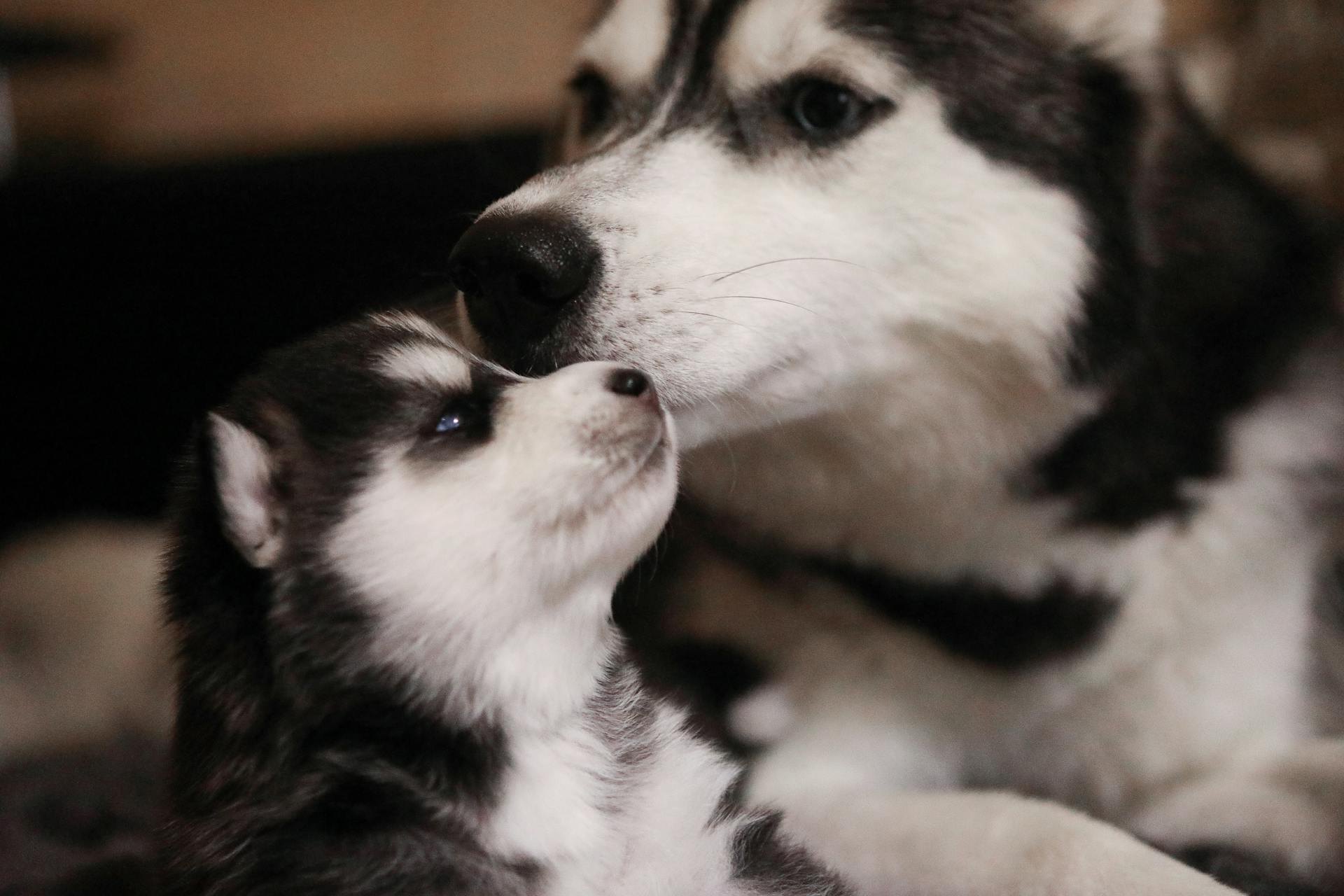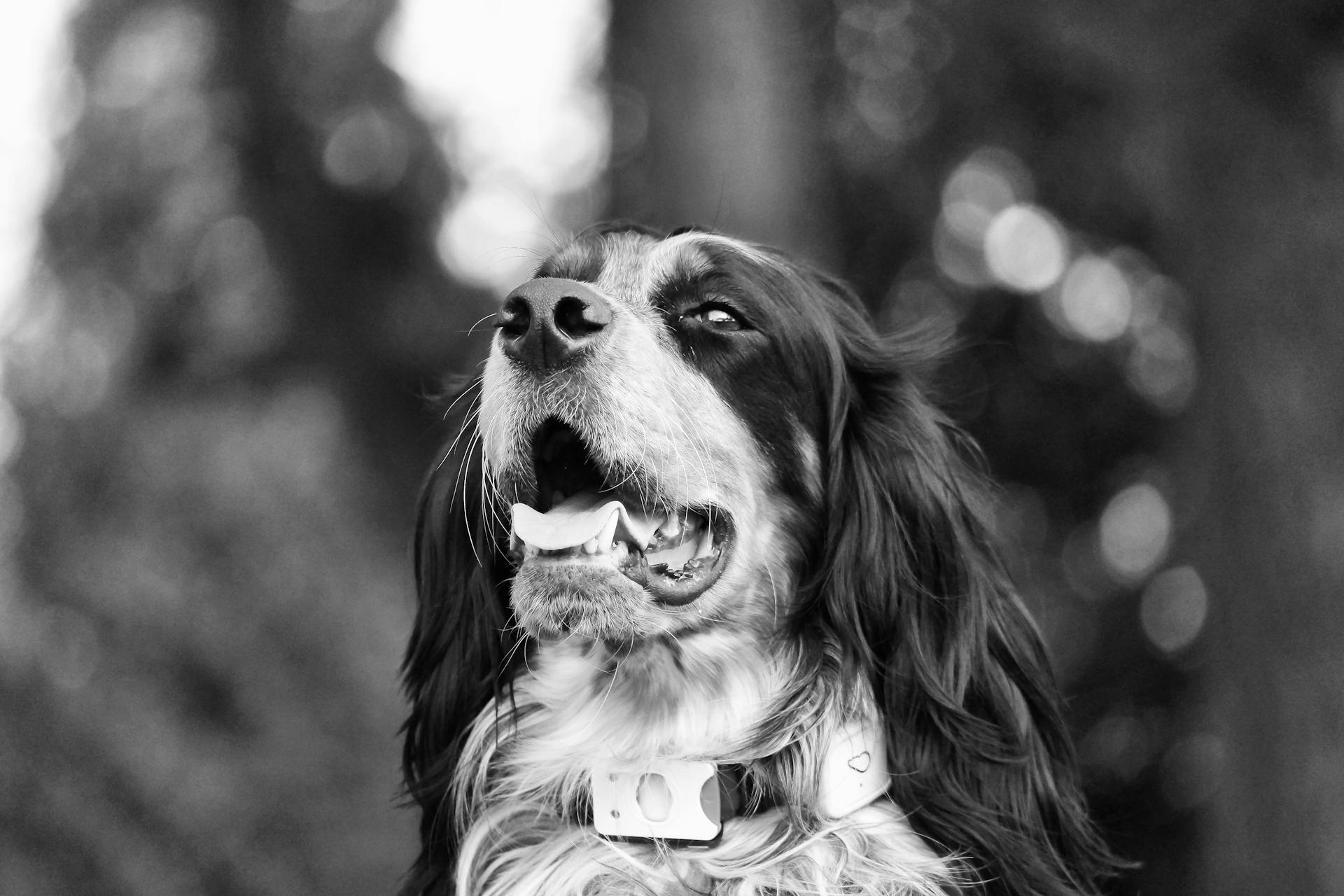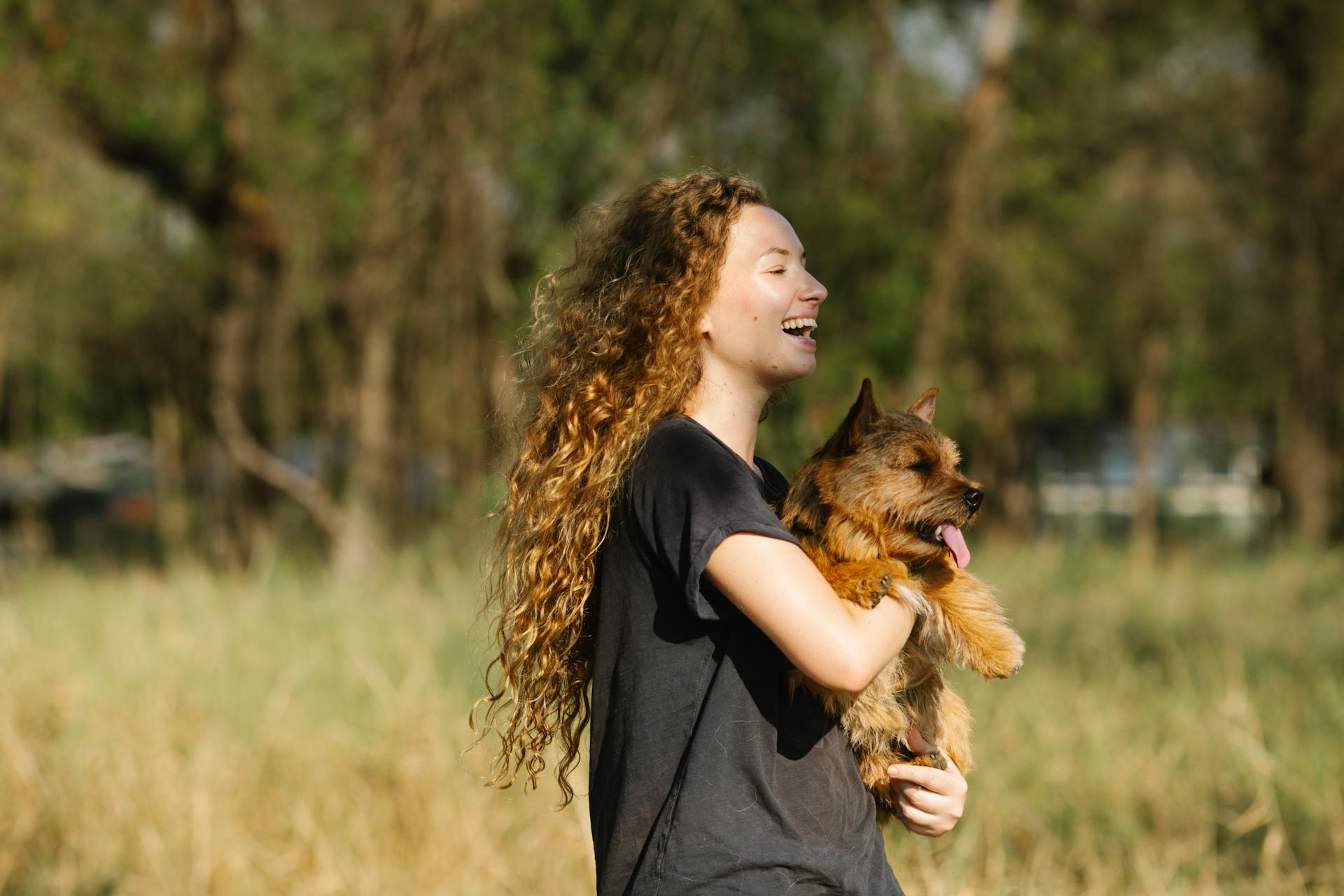
The decision to switch your furry friend to adult dog food can be a bit overwhelming, especially with so many options available. Typically, dogs are ready to switch to adult food between 12 to 18 months of age.
As puppies grow, their nutritional needs change. Between 6 to 12 months, they require a nutrient-rich food that supports their rapid growth and development. After this period, their energy needs decrease, and they can transition to a more balanced adult diet.
Some breeds, however, may mature faster or slower than others. For example, small breeds like Chihuahuas may be ready for adult food as early as 9 months, while larger breeds like Great Danes may not reach maturity until 18 months or older.
Recommended read: How to Switch Dog Food Brands
When to Switch
Switching your puppy to adult food is a crucial decision that requires careful consideration. You want to ensure your puppy gets the right nutrients to support their growth and development.
A different take: Will Puppy Food Hurt Older Dogs
Puppies should switch to adult dog food when they've reached about 80% of their adult size. This can be hard to gauge, especially with mixed breeds. Their breed size, spaying or neutering status, and activity level also play a role in determining when to make the switch.
Small and medium dogs typically reach maturity around 9-12 months, while larger dogs mature slower at about 12-15 months, and giant breeds even later at 18-24 months. It's always best to double-check with your vet before making any changes to your dog's diet.
Switching too early or too late can have negative consequences. If you switch too early, your puppy may suffer from nutritional deficiencies and growth abnormalities. Conversely, switching too late can lead to obesity and associated health problems later in life.
Here's a rough estimate of when to switch your puppy to adult food based on their breed size:
Keep in mind that every dog is different, and your vet can provide guidance on your specific breed. It's essential to make the switch gradually to prevent gastrointestinal upset.
Factors Affecting Food Choice
As you consider what to feed your young adult dog, there are several factors to keep in mind. The young adult stage is typically considered 1-4 years of age, a time when dogs are generally quite healthy but still developing.
Age is a key factor in choosing the right dog food, as different life stages require different nutrients. In many dog breeds, middle age starts by year 5-7, so it's essential to consider your dog's age when selecting a food.
The risk of obesity, arthritis, and dental disease increases with age, so feeding your young adult dog a balanced diet can help lower these risks.
Additional reading: Why Are Dogs so Food Motivated
Level of Activity
Dogs that engage in high-intensity activities like agility work or endurance activities may require more calories and fat in their adult dog formulas, up to 10-20% more fat.
Working dogs, like those in search and rescue or guiding roles, often have high energy needs to support their physically demanding work.
Curious to learn more? Check out: Is High Protein Dog Food Good for Dogs

Dogs that are minimally active, such as those kept as pets and not engaging in regular exercise, may benefit from diets with at least 10% fiber on a dry matter basis to ensure gut regularity.
Spayed or neutered dogs with minimally active lifestyles can typically be fed 15-20% less than the amount recommended on the dog food label to avoid weight gain and related health issues.
Dogs that are highly active, like athletic dogs, may benefit from staying on puppy formulas longer due to their extra protein and higher caloric density.
How to Choose
Choosing the right food for your dog can be a daunting task, especially with so many options available. Look for the "complete and balanced" AAFCO statement on the packaging, which ensures the food has been found to be complete and balanced based on formulation or AAFCO feeding trials.
The size of your dog is also a crucial consideration. Large breed dogs, for example, may require a food formulated specifically for their needs, such as joint health.

Monitoring your dog's reaction to the food is the best way to tell if it's right for them. This includes checking their haircoat, energy levels, stool quality, and quantity. If everything checks out, then the food is likely good for your dog.
Here are some key factors to consider when choosing a food for your dog:
The young adult stage of a dog's life is typically considered 1-4 years of age, during which feeding them appropriately can help lower the risk of obesity, arthritis, and dental disease as they age.
Transitioning to Adult Food
The transition to adult food is a crucial process for your puppy's growth and development. Puppies should switch to adult dog food when they have matured, or reached roughly 80% of their adult size.
Deciding when to switch your dog from puppy to adult food depends on a variety of factors, including breed size, whether they've been spayed or neutered, and their activity level. The consensus among veterinary professionals is that puppies should switch to adult dog food when they have matured, or reached roughly 80% of their adult size.
Explore further: Switch Ferret Food
To transition your puppy to adult food, it's best to make the switch gradually over a period of 5-7 days. You can start by mixing a small amount of adult dog food with their puppy food, and slowly transition so that the mixture becomes more adult dog food than puppy food over the course of the week.
Here's a rough guide to help you determine when to switch your puppy to adult food based on breed size:
Remember to always consult with your veterinarian if you're unsure when to switch your puppy to adult food.
How to Switch
To switch your puppy to adult dog food, it's essential to do it gradually. This will help avoid stomach irritation or other digestive issues.
You should start by mixing a small amount of adult dog food with their puppy food, and slowly transition to more adult dog food over the course of a week. This can be done by introducing the new food slowly over a period of five days or so.
Here's a suggested feeding schedule to follow:
If your puppy develops vomiting, diarrhea, or lack of appetite, stop feeding the adult dog food and see your veterinarian. It's always better to err on the side of caution and consult a professional if you're unsure about anything.
Transitioning Symptoms
Keep a close eye on your dog's behavior and physical condition during the transition period.
It's essential to verify that your dog continues to drink the recommended amount of water.
Your dog's gas should ideally remain low, but if it's constantly passing gas, it may be a sign that it's not processing the new food properly.
Your dog's stools should be normal, and any runny stool can raise concerns about diarrhea and dehydration.
If you notice a lot of change in these areas, slow down the transition process and give your dog more time to adjust.
Consider gradually reverting to the old diet if the transition isn't working, as it's possible that your dog is allergic to the new food.
- Verify that your dog continues to drink the recommended amount of water.
- Your dog's gas should ideally remain low.
- Your dog’s stools should be normal.
Weaning
Weaning your puppy to adult food is a crucial step in their development. It's essential to make the switch gradually to avoid stomach irritation or other digestive issues.
Puppies require different nutrition than adult dogs, so you don't want to make the switch too early or you could impact their development. Generally, puppies should stay on puppy diets too long than it is to make the switch too soon.
The consensus among veterinary professionals is that puppies should switch to adult dog food when they have matured, or reached roughly 80% of their adult size. But maturity can be hard to gauge, and with mixed breeds, it's not always clear what their final size will be.
Here's a rough guide to help you determine when to switch your puppy to adult food:
- 9-12 months for toy, small and medium breeds like Chihuahuas and Springer Spaniels
- 12-15 months for large breeds like Labradors and Retrievers
- 18-24 months for giant breeds like Great Danes and Newfoundlands.
It's also essential to consider whether your puppy has been spayed or neutered and their activity level when deciding when to switch them to adult food.
Check this out: What to Feed Dogs If No Dog Food
Softening Pedigree with Water Before Feeding
Softening Pedigree with Water Before Feeding can be a helpful way to make mealtime more appealing to your puppy. Adding warm water to dry dog food is a simple process.
You can moisten dry food by adding warm (but not boiling) water. This helps soften the kibble, making it easier for your puppy to chew and swallow.
Offer the food to your puppy when the meal has cooled, and the food has soaked up the water. This ensures the food is not too hot or too wet for your puppy.
Encourage your puppy to eat the food dry if you can, because it's good for their teeth.
For your interest: Pedigree Dog Food Killing Dogs
Puppy Feeding Guidelines
Puppies need to eat more calories and protein than adult dogs to support their growth and development.
Feeding puppies too much can lead to joint problems later in life, so it's essential to find the right balance.
Puppies should eat three times a day until they're about six months old, then you can start to transition them to twice a day.
For large breed puppies, it's best to continue feeding them three times a day, while medium and small breed puppies can start eating twice a day.
Some dogs may benefit from high-fiber adult dog food to help them feel full between meals.
Here's a rough guide to help you determine when to switch your puppy to adult food:
Remember, every puppy is different, and your veterinarian can provide personalized advice on feeding your puppy.
Breed Size
Puppies mature at different rates depending on their size. Small breeds like Chihuahuas and Pugs reach adult size sooner than larger breeds like Golden Retrievers and German Shepherds.
Small breeds typically reach adult size between 10 to 12 months of age. Medium-sized breeds like English Springer Spaniels and Australian Shepherds take a bit longer, reaching adult size between 12 to 15 months.
Large breeds, on the other hand, take the longest to mature. They can reach adult size between 15 to 24 months. This is because they have larger skeletons that need more time to develop.
Recommended read: Merrick Dog Food for Small Dogs
Here's a rough guide to help you determine when to switch to adult dog food based on your puppy's breed size:
Remember, these are general guidelines and the best way to determine the right time to switch to adult food is to consult with your veterinarian. They can provide personalized advice based on your puppy's specific needs and breed.
Puppies (4 weeks to 2 years)
Puppies (4 weeks to 2 years) need a balanced diet to support their growth and development. Puppies require more calories and protein than adult dogs, but excessive amounts can lead to joint problems later in life.
A puppy's growth rate determines when to switch to adult food. Small breeds like Chihuahuas and Yorkshire Terriers reach adult size at 10-12 months, while large breeds like Golden Retrievers and German Shepherds take longer to mature, typically at 15-24 months.
Puppy food is specifically formulated for ideal growth, with a balanced diet and supplements for brain development. Large breed puppies benefit from a specially formulated large breed puppy food that has balanced calcium-to-phosphorus ratios.
Worth a look: Food Diet for Dogs
Puppies should be fed according to their breed size. Small breeds (under 25 pounds) can start eating adult dog food at 9-10 months, while medium-sized breeds (25-50 pounds) are ready at 12-14 months. Large breeds (over 50 pounds) should stay on puppy food until 14-24 months.
Here's a rough guide to help you determine when to switch to adult food based on breed size:
Remember, every puppy is different, and it's always best to consult with your veterinarian for personalized advice on feeding your furry friend.
Frequently Asked Questions
How long should a puppy eat puppy food?
Puppies typically transition to adult dog food between 10 to 12 months of age, but it's best to consult with a veterinarian for a personalized feeding plan.
What happens if a puppy eats adult dog food?
Puppies may experience occasional stomach upset if fed adult dog food, but it's unlikely to cause serious harm. However, it's recommended to feed puppy-specific food for optimal health and development
Sources
- https://nutrisourcepetfoods.com/blog/pet-parents/when-to-switch-to-adult-dog-food/
- https://www.petmd.com/dog/nutrition/when-should-you-switch-puppy-adult-dog-food
- https://be.chewy.com/the-ages-and-stages-of-dog-food-from-puppy-to-adult-to-senior/
- https://www.pedigree.com.ph/puppy/feeding-my-puppy/puppy-feeding-faqs
- https://www.harringtonspetfood.com/blogs/pet-advice/how-and-when-to-transition-your-puppy-to-adult-food-1
Featured Images: pexels.com


